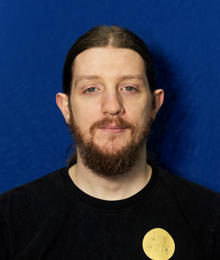An interview with David Slade
March 2020
David Slade is a PhD student at The Open University and a member of the Microbiology Society. In this interview, he tells us more about his research on microbial survival in extra-terrestrial environments and why building an understanding of life on other planets is important to microbiology.

Tell us about your research
My research focuses on what I call the three ‘M’s, Mars, methane and methanogens. I simulate Martian subsurface environments (thermophysical and chemical) and grow methanogens in these simulated conditions. I then analyse the gases produced to determine what suite of atmospheric biosignatures might be present and detectable in the atmosphere of Mars.
You are studying microbial survival in extra-terrestrial environments. How did you go about this research and what were the key outcomes?
My PhD project is the first time I've studied microbes in extra-terrestrial environments, but look forward to presenting results to my colleagues in the astrobiology and microbiology communities in the very near future.
My previous work at master’s level focused on the transfer of bacterial spores from space-grade aluminium surfaces into simulated Martian regolith. The outcome of my research suggested that spores readily and easily transfer between the two, which has major implications for the planetary protection of Mars from forward contamination of Earth-based bacterial spores.
What qualifications did you obtain before starting this role?
Before undertaking a PhD, I completed a BSc in Biology and a master’s degree in Biological Sciences.
What are the professional challenges that present themselves and how do you try to overcome them?
As an experimental researcher, when trying to simulate thermo-physical parameters of another celestial body, I regularly have to overcome laboratory challenges. Some are more unique than others, but all represent a valuable opportunity to learn something new about growing microbes in simulated environments.
What is a typical working day for you?
A typical day is split between laboratory work; which often involves maintaining stock cultures, cleaning glassware, sterilising equipment and desk work which entails reading new research, thesis writing and paper writing.
Tell us about your biggest professional achievement(s) so far.
My biggest achievement so far is most definitely being accepted onto a PhD project.
You are an active member of the Microbiology Society – tell us more about your involvement
I love to engage with the Society and especially with things like this, which give researchers the chance to showcase their interests with a little more flair, when compared to scientific publications.
Why is it important to be a member of an organisation like the Microbiology Society?
Being a member of the Microbiology Society is invaluable. I am able to access resources online, to stay up to date with current microbiological research, as well as engaging with colleagues in the field of microbiology and developing an understanding of how the field is advancing. Societies such as the Microbiology Society work incredibly hard to ensure that researchers can collaborate and share their ideas, which is vital for the research community.
Where did your interest in microbiology come from?
My interest began with astrobiology and the search for life on other planets. When assessing my skills and interests to determine how I wanted to tackle research questions associated with the search for life, I tried a number of different disciplines. Microbiology piqued my interest as microbes represent some of the oldest organisms on Earth and were certainly among the first – especially archaea. From there, I began to research how microbiology fits into the context of astrobiology; how I could shape my research and use microbiology as a tool to answer fundamental questions like; 'are we alone in the universe?'
Why does understanding life on other planets matter to microbiology?
The question of whether life exists on other planets is a fundamental quest that penetrates throughout time on a scientific and philosophical level. Using Earth as a model for how life develops, microbes are among the first forms of life to emerge. Therefore, there is an intrinsic link between microbiology and the possible emergence of life on other celestial bodies. If life is found on another celestial body, that would most likely have enormous scientific, societal and philosophical implications for every human being on Earth, and it all starts with microbiology.


